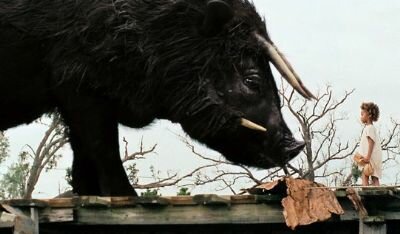
|
| |
| |
|
|
| |
|
|
| |
Beasts of the Southern Wild
(12A)
© Unknown - all rights reserved
|
| |
|
|
| |
 |
| Tookey's Rating |
|
|
1 /10
|
| |
| Average Rating |
|
|
7.79 /10
|
| |
| Starring |
Quvenzhane Wallis  , Dwight Henry, , Dwight Henry, |
|
|
|
|
| |
Directed by: Benh Zeitlinr 
Written by: Benh Zeitlin and Lucy Alibar  , based on Alibar’s play Juicy and Delicious , based on Alibar’s play Juicy and Delicious
|
|
| |
|
|
| Tookey's Review |
|
| Pro Reviews |
|
| Mixed Reviews |
|
| Anti Reviews |
|
| Cast |
|
| |
 |
| |
| Released: |
2012 |
| |
|
| Genre: |
DRAMA
OVERRATED
|
| |
|
| Origin: |
US |
| |
|
| Colour: |
C |
| |
|
| Length: |
93 |
|
| |
|
| |
|
|
| |
|
|
The drivel runs through it.
|
Reviewed by Chris Tookey
|
Arriving here on a tsunami of enthusiastic acclaim is Beasts of the Southern Wild, a film shot in Louisiana with non-professional actors. It has won the Camera d’Or at Cannes and the grand jury prize at the Sundance Film Festival, and attracted five-star reviews wherever it goes. It’s absolutely dreadful but will appeal to the prejudices of anyone who found Terrence Malick’s Tree of Life a timeless masterpiece, or David Gordon Green’s bore-a-thon George Washington life-affirming.
The title makes it sound like a nature film, but 29 year-old director Benh Zeitlin’s film is smug liberal hokum that patronises its subject-matter, the rural poor of America. It’s a memorably daft collision of social realism and left-wing wishful thinking.
The setting is a fictitious area of Louisiana called “the bathtub”, and it’s about a six year-old black girl nicknamed Hushpuppy (Quvenzhane Wallis, pictured) and her abusive, alcoholic father (Dwight Henry) who inhabit neighbouring shacks, preparing – or rather not preparing – for a violent storm to flood their shanty-village community. When disaster does strike, it’s the brave little girl who brings the cosily anarchic locals together. It’s supposed to be a story of survival and fortitude, though I can’t say I bought any of it.
Hushpuppy is meant to be precocious, but really she’s precious. She delivers would-be poetic pronouncements about her place in the universe, which suggest that someone in her brief past may have exposed her to scientology. How far you respond to her will depend on what you make of her windy pronouncements, such as "The whole universe depends on everything fitting together just right" and "I see that I'm a little piece of a big, big universe, and that makes things right".
When not teeth-grindingly pretentious, her sayings float off into the downright meaningless: “When it all goes quiet behind my eyes,” she says, “I see everything that made me flying around in invisible pieces.” This kind of nonsensical philosophizing by a supposedly down-to-earth, uneducated child, especially when accompanied by the director’s repellently schlocky, string-laden score, made me feel I was being sold a fake view not only of infancy, but of life.
Despite her lack of education, Hushpuppy is particularly concerned about global warming and has visions of Antarctica crumbling, so I guess somehow she must have gained access to former vice-president Al Gore’s largely discredited documentary An Inconvenient Truth.
She also has the power to conjure up huge prehistoric creatures called aurochs, though to my untutored eye they looked exactly like wild boar with horns stuck on them. These exist in the film purely so she can awe them all with her simple goodness, though I notice she doesn’t try the same technique with the local alligators. This vision of life in the bayou is where the wild things aren’t.
The screenplay doesn’t have a credible narrative – for example, the negligent father changes character abruptly half way through. It simply drifts on a self-created tide of optimistic complacency. Its one idea of happiness is to have the little girl embraced by a sisterhood of warm-hearted, motherly prostitutes, the kind you see a lot of in the movies.
The look of the film is art-house squalor, and the slum dwellings are triumphs of artfully contrived recycling. Cinematographer Ben Richardson goes for a lot of jittery camera movement and out-of-focus shots to give everything a semblance of realism, but it still looks like picturesque poverty as cleaned up for The World of Inferiors.
For me, the movie stinks of the worst sort of cultural tourism. It suggests that the poor are happy to live in squalor because they don’t know any better and wouldn’t appreciate money, medicine and sanitation even if they had it. It’s so infatuated with its fake authenticity that it refuses to countenance any of the uncomfortable socio-political realities that lie beneath.
It is, in short, pernicious rubbish, but that doesn’t mean it won’t get Oscar-nominated for Best Film. In the same way that Extremely Loud, Incredibly Close sentimentalized 9/11 by using a child’s-eye view to avoid addressing any of the really troubling issues, this film does an identical job on Hurricane Katrina.
|
|
|
|
|
|
